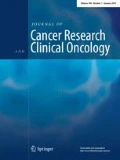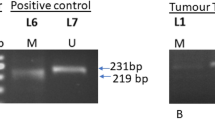Abstract
Purpose
Insulin-like growth factor binding protein 7 (IGFBP-7) is considered a tumor suppressor in various cancers, but its role in colorectal cancer (CRC) is still uncertain. The aims of this study were to analyze the IGFBP-7 expression, and explore the mechanism responsible for the inactivation of IGFBP-7 in CRC.
Methods
mRNA expression was studied by RT-PCR and Northern blot analysis of cultured cells. Methylation status was analyzed by treatment with 5-aza-2′-deoxycytidine followed by sequencing of PCR products of sodium bisulfite-treated genomic DNA. IGFBP-7 protein expression was evaluated by immunohistochemistry (IHC) on tissue microarrays.
Results
mRNA expression was lost in six out of eight CRC cell lines as compared to normal colon cells. DNA methylation was found in the region of exon 1 and intron 1 of IGFBP-7. In tumor tissue, 107 out of 279 samples showed a negative expression of IGFBP-7 by IHC, which was significantly associated with poor prognosis. The analysis of 37 paired cancerous and normal mucosa samples confirmed the downregulation in the tumors, but revealed variable basal expression levels of IGFBP-7 in normal mucosal samples.
Conclusions
DNA methylation is a mechanism responsible for IGFBP-7 gene silencing providing a target for therapeutic intervention of this tumor suppressor gene.





Similar content being viewed by others
References
Adachi Y, Itoh F, Yamamoto H, Arimura Y, Kikkawa-Okabe Y, Miyazaki K, Carbone DP, Imai K (2001) Expression of angiomodulin (tumor-derived adhesion factor/mac25) in invading tumor cells correlates with poor prognosis in human colorectal cancer. Int J Cancer 95:216–222
Akaogi K, Okabe Y, Funahashi K, Yoshitake Y, Nishikawa K, Yasumitsu H, Umeda M, Miyazaki K (1994) Cell adhesion activity of a 30-kDa major secreted protein from human bladder carcinoma cells. Biochem Biophys Res Commun 198:1046–1053
Baglioni S, Genuardi M (2004) Simple and complex genetics of colorectal cancer susceptibility. Am J Med Genet C Semin Med Genet 129:35–43
Burger AM, Zhang X, Li H, Ostrowski JL, Beatty B, Venanzoni M, Papas T, Seth A (1998) Down-regulation of T1A12/mac25, a novel insulin-like growth factor binding protein related gene, is associated with disease progression in breast carcinomas. Oncogene 16:2459–2467
Burger AM, Leyland-Jones B, Banerjee K, Spyropoulos DD, Seth AK (2005) Essential roles of IGFBP-3 and IGFBP-rP1 in breast cancer. Eur J Cancer 41:1515–1527
Chen Y, Huhn D, Knösel T, Pacyna-Gengelbach M, Deutschmann N, Petersen I (2005) Downregulation of connexin 26 in human colon cancer is related to promoter methylation. Int J Cancer 113:14–21
Cruz-Correa M, Cui H, Giardiello FM, Powe NR, Hylind L, Robinson A, Hutcheon DF, Kafonek DR, Brandenburg S, Wu Y, He X, Feinberg AP (2004) Loss of imprinting of insulin growth factor II gene: a potential heritable biomarker for colon neoplasia predisposition. Gastroenterology 126:964–970
Degeorges A, Wang F, Frierson HF Jr, Seth A, Chung LW, Sikes RA (1999) Human prostate cancer expresses the low affinity insulin-like growth factor binding protein IGFBP-rP1. Cancer Res 59:2787–2790
Degeorges A, Wang F, Frierson HF Jr, Seth A, Sikes RA (2000) Distribution of IGFBP-rP1 in normal human tissues. J Histochem Cytochem 48:747–754
Hamilton SR, Aaltonen LA (2000) World Health Organization classification of tumors. Pathology & genetics, tumors of the digestive system. IARC, Lyon, pp 104–106
Hwa V, Oh Y, Rosenfeld RG (1999) The insulin-like growth factor binding protein (IGFBP) superfamily. Endocr Rev 20:761–787
Knösel T, Yu Y, Stein U, Schwabe H, Schluns K, Schlag PM, Dietel M, Petersen I (2004) Overexpression of cyclooxygenase-2 correlates with chromosomal gain at the cyclooxygenase-2 locus and decreased patient survival in advanced colorectal carcinomas. Dis Colon Rectum 47:70–77
Komatsu S, Okazaki Y, Tateno M, Kawai J, Konno H, Kusakabe M, Yoshiki A, Muramatsu M, Held WA, Hayashizaki Y (2000) Methylation and downregulated expression of mac25/insulin-like growth factor binding protein-7 is associated with liver tumorigenesis in SV40T/t antigen transgenic mice, screened by restriction landmark genomic scanning for methylation (RLGS-M). Biochem Biophys Res Commun 267:109–117
Kononen J, Bubendorf L, Kallioniemi A, Barlund M, Schraml P, Leighton S, Torhorst J, Mihatsch MJ, Sauter G, Kallioniemi OP (1998) Tissue microarrays for high-throughput molecular profiling of tumor specimens. Nat Med 4:844–847
Landberg G, Ostlund H, Nielsen NH, Roos G, Emdin S, Burger AM, Seth A (2001) Downregulation of the potential suppressor gene IGFBP-rp1 in human breast cancer is associated with inactivation of the retinoblastoma protein, cyclin E overexpression and increased proliferation in estrogen receptor negative tumors. Oncogene 20:3497–3505
Lichtenstein P, Holm NV, Verkasalo PK, Iliadou A, Kaprio J, Koskenvuo M, Pukkala E, Skytthe A, Hemminki K (2000) Environmental and heritable factors in the causation of cancer—analyses of cohorts of twins from Sweden, Denmark, and Finland. N Engl J Med 343:78–85
Murphy M, Pykett MJ, Harnish P, Zang KD, George DL (1993) Identification and characterization of genes differentially expressed in meningiomas. Cell Growth Differ 4:715–722
Mutaguchi K, Yasumoto H, Mita K, Matsubara A, Shiina H, Igawa M, Dahiya R, Usui T (2003) Restoration of insulin-like growth factor binding protein-related protein 1 has a tumor-suppressive activity through induction of apoptosis in human prostate cancer. Cancer Res 63:7717–7723
Oh Y, Nagalla SR, Yamanaka Y, Kim HS, Wilson E, Rosenfeld RG (1996) Synthesis and characterization of insulin-like growth factor binding protein (IGFBP)-7. J Biol Chem 271:30322–30325
Petersen S, Heckert C, Rudolf J, Schluns K, Tchernitsa OI, Schafer R, Dietel M, Petersen I (2000) Gene expression profiling of advanced colon cancer. Int J Cancer 86:512–517
Renehan AG, Zwahlen M, Minder C, O’Dwyer ST, Shalet SM, Egger M (2004) Insulin-like growth factor (IGF)-I, IGF binding protein-3, and cancer risk: systematic review and meta-regression analysis. Lancet 363:1346–1353
Shao L, Huang Q, Luo M, Lai M (2004) Detection of the differentially expressed gene IGF-binding protein-related protein-1 and analysis of its relationship to fasting glucose in Chinese colorectal cancer patients. Endocr Relat Cancer 11:141–148
Sprenger CC, Damon SE, Hwa V, Rosenfeld RG, Plymate SR (1999) Insulin-like growth factor binding protein-related protein 1 (IGFBP-rP1) is a potential tumor suppressor protein for prostate cancer. Cancer Res 59:2370–2375
Swisshelm K, Ryan K, Tsuchiya K, Sager R (1995) Enhanced expression of an insulin growth factor-like binding protein (mac25) in senescent human mammary epithelial cells and induced expression with retinoic acid. Proc Natl Acad Sci USA 92:4472–4476
Tennant MK, Vessella RL, Sprenger CC, Sikes RA, Hwa V, Baker LD, Plymate SR (2003) Insulin-like growth factor binding protein-related protein (IGFBP-rp1/mac25) is reduced in human prostate cancer and is inversely related to tumor volume and proliferation index in Lucap 23.12 xenografts. Prostate 56:115–122
Umeda F, Ono Y, Sekiguchi N, Hashimoto T, Masakado M, Nakamura K, Chijiiwa Y, Nawata H (1998) Increased mRNA expression of a novel prostacyclin-stimulating factor in human colon cancer. J Gastroenterol 33:213–217
Weitz J, Koch M, Debus J, Hohler T, Galle PR, Buchler MW (2005) Colorectal cancer. Lancet 365:153–165
Wilson HM, Birnbaum RS, Poot M, Quinn LS, Swisshelm K (2002) Insulin-like growth factor binding protein-related protein 1 inhibits proliferation of MCF-7 breast cancer cells via a senescence-like mechanism. Cell Growth Differ 13:205–213
Yamauchi T, Umeda F, Masakado M, Isaji M, Mizushima S, Nawata H (1994) Purification and molecular cloning of prostacyclin-stimulating factor from serum-free conditioned medium of human diploid fibroblast cells. Biochem J 303:591–598
Yang YX, Hennessy S, Lewis JD (2004) Insulin therapy and colorectal cancer risk among type 2 diabetes mellitus patients. Gastroenterology 127:1044–1050
Acknowledgments
We appreciate that Dr Antje Siegert kindly provided us with the colon cancer cell line CX2. We thank Martina Eickmann for editorial assistance. This work was supported by a grant from the Deutsche Krebshilfe (grant 10-2210-Pe 4). Mrs Fei Ye received an Ernst from Leyden Fellowship of the Berlin Cancer Society during her stay at the Charité.
Author information
Authors and Affiliations
Corresponding author
Rights and permissions
About this article
Cite this article
Ye, F., Chen, Y., Knösel, T. et al. Decreased expression of insulin-like growth factor binding protein 7 in human colorectal carcinoma is related to DNA methylation. J Cancer Res Clin Oncol 133, 305–314 (2007). https://doi.org/10.1007/s00432-006-0171-z
Received:
Accepted:
Published:
Issue Date:
DOI: https://doi.org/10.1007/s00432-006-0171-z




